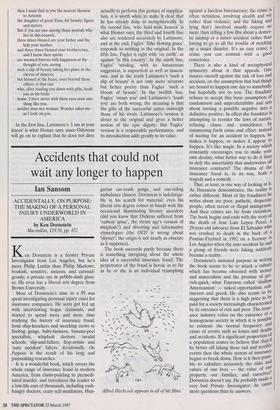Accidents that could not wait any longer to happen
Ian Sansom
ACCIDENTALLY, ON PURPOSE: THE MAKING OF A PERSONAL INJURY UNDERWORLD IN AMERICA by Ken Dornstein Macmillan, £19.50, pp. 452 Ken Dornstein is a former Private Investigator from Los Angeles, but he's more Philip Larkin than Philip Marlowe: bookish, sensitive, anxious, and curmud- geonly; a private eye in pebble-dash glass- es. He even has a liberal arts degree from Brown University.
Most of Dornstein's time as a PI was spent investigating personal injury cases for insurance companies. He soon got fed up with interviewing bogus claimants, and started to spend more and more time studying the history of insurance fraud, from ship-knockers and wrecking crews to firebug gangs, baby-farmers, banana-peel specialists, whiplash doctors, invalid schools, slip-and-fallers, flop-artists and `auto accident' fakers. Accidentally, On Purpose is the result of his long and painstaking researches.
It is a wonderful book, which covers the whole range of insurance fraud in modern America, from claim-padding to premedi- tated murder, and introduces the reader to a low-life cast of thousands, including cash- hungry doctors, crazy self-mutilators, Hun- garian car-crash gangs„ and out-riding ambulance chasers. Dornstein is indefatiga- ble in his search for material: even his liberal arts degree comes in handy with the occasional illuminating literary anecdote (did you know that Dickens suffered from `railway spine', the steam age's version of whiplash?) and diverting and informative etymologies (the OED is wrong about `shyster'; the origin is not nearly as obscure as it supposes).
The book succeeds partly because there is something intriguing about the whole idea of a successful insurance fraud. The perpetrator of the fraud is heroic in so far as he or she is an individual triumphing Alfred Hitchcock appears in all of his films,' against a faceless bureaucracy; the crime is often victimless, involving stealth and wit rather than violence; and the faking and lying that's involved usually require no more than telling a few fibs about a domes- tic mishap or a minor accident rather than having to go to all the trouble of mocking up a major disaster. It's an easy crime; a crime you can commit with a good conscience.
There is also a kind of metaphysical symmetry about it that appeals. One insures oneself against the risk of loss and accident, on the assumption that bad things are bound to happen one day to somebody, but hopefully not to you. The fraudster refuses to accept this basic assumption of randomness and unpredictability and sets about turning a possible negative into a definitive positive. In effect the fraudster is attempting to reorder the laws of nature, refusing chaos and coincidence by summoning forth cause and effect: instead of waiting for an accident to happen, he makes it happen, or makes it appear to happen. It's like magic. In a society which constantly encourages you to make your own destiny, what better way to do it than to defy the uncertainty that underwrites all insurance contracts? The drama of the insurance fraud is, in its way, both a tragedy and a comedy. That, at least, is one way of looking at it. As Dornstein demonstrates, the reality Is rather different. Most of the fraudsters he writes about are poor, pathetic, desperate people, often recent or illegal immigrants. And their crimes are far from victimless. The book begins and ends with the story of the death of Jose Luis Lopez Perez, a 29-year-old labourer from El Salvador who was crushed to death in the back of a Pontiac-Firebird in 1992 on a freeway in Los Angeles when the auto accident he and a group of friends were faking suddenly became a reality. Dornstein's unstated purpose in writing the book seems to be to attack a culture which has become obsessed with money and materialism and the promise of get- rich-quick, what Emerson called `shallow Americanism' — naked opportunism, self- interest and greed. He also seems to be suggesting that there is a high price to be paid for a society increasingly characterised by its extremes of rich and poor. The insur- ance industry relies on the existence of a homogenous society in which it is possible to estimate the normal frequency and cause of events such as losses and deaths and accidents. If a significant proportion of a population comes to believe that they d be better off faking these sad and terrible events then the whole system of insurance begins to break down. How is it then possi- ble to calculate accurately the risks and values of our lives — the value of etf, property, our families, and ourselves? Dornstein doesn't say. He probably made a very bad Private Investigator: he raises more questions than he answers.


































































 Previous page
Previous page